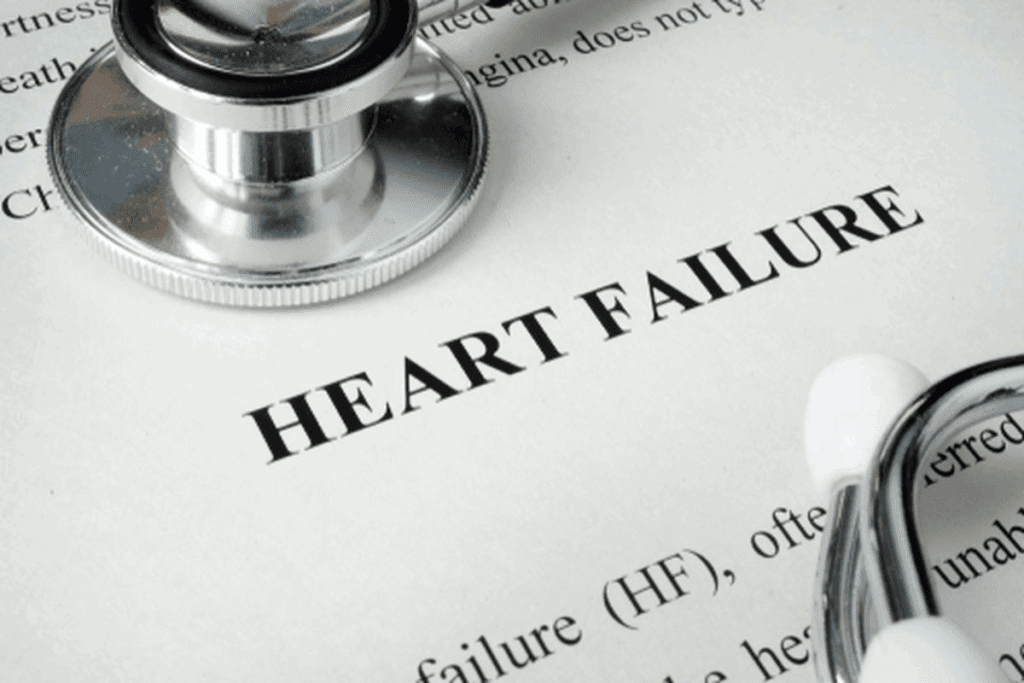Last Updated on November 25, 2025 by Ugurkan Demir

Decompensated HF (heart failure) is a serious medical condition in which the heart can’t pump enough blood to meet the body’s needs. This often leads to fluid buildup in the lungs and other parts of the body. It requires immediate medical attention, as untreated decompensated HF can result in life-threatening complications.
Heart failure is a complex condition where the heart struggles to function efficiently. Decompensated HF occurs when a person with chronic heart failure experiences worsening symptoms. This can happen due to poor treatment adherence, new cardiac problems, or additional health issues that put extra strain on the heart.

To understand heart failure, we need to know how the heart works and what happens when it fails. Heart failure is a long-term condition where the heart can’t pump enough blood for the body’s needs.
The heart is a muscular organ that pumps blood all over the body. It supplies oxygen and nutrients and removes waste. Its normal function is key to staying healthy.
The heart’s pumping is controlled by electrical impulses, muscle contractions, and valves. These ensure blood flows the right way. When it beats, it pushes blood into arteries, which carry it to the rest of the body.
In heart failure, the heart can’t pump blood well. This leads to fatigue, shortness of breath, and swelling in the legs because of fluid buildup.
Heart failure can be caused by many things, like coronary artery disease, high blood pressure, diabetes, and heart valve problems. Knowing these causes helps manage heart failure better.
| Cause | Description | Impact on Heart Function |
| Coronary Artery Disease | Narrowing or blockage of coronary arteries | Reduces blood flow to the heart muscle |
| High Blood Pressure | Elevated pressure in the arteries | Increases workload on the heart |
| Diabetes | High blood sugar levels | Damages heart muscle and nerves |

When the heart’s efforts to keep up fail, decompensated heart failure happens. This is a serious condition that can be life-threatening. It occurs when the heart can’t pump enough blood to meet the body’s needs, causing a big drop in health.
Decompensation in heart failure means the heart can’t function well enough. It can’t keep up with the body’s needs, leading to fluid buildup and other problems. Decompensated HF shows as shortness of breath, fatigue, and swelling. These symptoms greatly lower a patient’s quality of life.
Decompensated heart failure can happen suddenly or slowly. Acute decompensated heart failure is when symptoms get worse fast, often needing quick hospital care. On the other hand, chronic decompensated heart failure is a slow decline in heart function. It may need changes in treatment and lifestyle.
| Characteristics | Acute Decompensated HF | Chronic Decompensated HF |
| Onset | Sudden | Gradual |
| Symptoms | Rapidly worsening shortness of breath, severe fatigue | Progressive fatigue, swelling, shortness of breath |
| Management | Immediate hospitalization, intensive care | Adjustments in medication, lifestyle modifications |
In compensated heart failure, the body finds ways to work around the heart’s weakness. This lets the heart keep pumping, even when it’s not working as well as it should. We’ll look at how the body manages this and what signs show that the heart is stable.
The body uses several ways to keep the heart pumping enough blood. These include:
These methods help the heart keep up with the body’s needs, even when it’s not working as well.
When heart failure is compensated, patients might not show many symptoms. Or, the symptoms they do have might be mild. Signs of stable heart failure include:
| Signs | Description |
| Mild Shortness of Breath | Patients may experience breathlessness only during moderate physical activity. |
| Minimal Swelling | Some swelling in the legs or ankles may be present but is not severe. |
| Fatigue | Patients may feel tired but are generally able to perform daily activities. |
Keeping an eye on these signs and sticking to treatment plans is key to keeping heart failure stable.
It’s important to know the difference between compensated and decompensated heart failure. Both involve the heart not pumping enough blood. But, the main differences are in symptoms, how the heart tries to compensate, and how it affects a person’s life.
In compensated heart failure, symptoms are mild. People might get a bit short of breath when they’re active. But they can usually do their daily tasks without too much trouble.
Decompensated heart failure is much worse. Symptoms like severe shortness of breath and fatigue are very bad. These symptoms need quick medical help.
The body tries to adapt in compensated heart failure. It does this by increasing heart rate and tightening blood vessels. But in decompensated heart failure, these efforts fail. This leads to a drop in blood flow and serious problems.
Something like a new illness or not taking medicine as directed can start decompensated heart failure. It’s like a tipping point that makes things worse.
People with compensated heart failure can live a pretty normal life. They might need to slow down a bit and make some changes. But they can usually do things they enjoy and stay independent.
Decompensated heart failure makes life much harder. The sudden and severe symptoms mean frequent hospital stays. It also limits what a person can do, affecting their happiness and freedom.
It’s important to know the warning signs of decompensated heart failure. This condition happens when the heart can’t pump enough blood. This leads to fluid buildup in the lungs and other parts of the body.
Respiratory symptoms are a key sign of decompensated heart failure. These symptoms include:
Fluid retention is another sign of decompensated heart failure. Patients may notice:
Cardiovascular symptoms can also point to decompensated heart failure. These symptoms include:
It’s vital for patients and caregivers to recognize these signs. Early treatment can greatly improve outcomes for decompensated heart failure.
Knowing what triggers heart failure decompensation is key. It happens when the heart can’t meet the body’s needs. This leads to fluid buildup and other problems. Spotting these triggers helps us care for patients better.
Medication non-adherence is a big problem. Heart failure patients need many medicines to stay healthy. Skipping or cutting doses can make symptoms worse. It’s vital to take all medicines as directed.
Dietary indiscretions also play a role. Eating too much sodium can cause fluid buildup. We suggest a low-sodium diet and avoiding salty foods.
Infections and illnesses can also set off heart failure decompensation. The body needs more blood and oxygen when fighting an infection. This puts extra stress on the heart. It’s important to stay clean and see a doctor if you feel sick.
Cardiac arrhythmias, or irregular heartbeats, can make heart failure worse. These irregularities can make the heart less efficient. Treating arrhythmias is key to avoiding decompensation.
By tackling these triggers, we can greatly improve life for heart failure patients. This reduces the chance of decompensation.
Diagnosing decompensated heart failure requires a detailed check-up. This includes a physical exam, lab tests, and imaging studies. These steps help doctors understand the condition well and plan the best treatment.
A detailed physical exam is key in spotting decompensated heart failure. Doctors look for signs like jugular venous distension and peripheral edema. They also check for lung congestion and abnormal blood pressure levels.
Labs are very important in diagnosing decompensated heart failure. Key tests include:
Imaging tests are vital for looking at the heart’s structure and function. Common tests include:
By using these methods together, doctors can accurately diagnose decompensated heart failure. They can then create a treatment plan that fits each patient’s needs.
Emergency treatment for acute decompensated heart failure is key to better patient outcomes. When a patient’s heart failure suddenly gets worse, quick medical help is needed. This helps stabilize their condition and prevents more problems.
The first step in treating acute decompensated heart failure is to stabilize the patient. This includes:
Medications are vital in managing acute decompensated heart failure. Common medications include:
Continuous monitoring is key to check the patient’s response to treatment and adjust as needed. This includes:
By following these emergency treatment steps, healthcare providers can manage acute decompensated heart failure well. This improves patient outcomes.
Managing heart failure over time needs a mix of medicine, lifestyle changes, and regular checks. We’ll dive into these methods to see how they help manage heart failure well.
Medicine is key in handling heart failure. ACE inhibitors and beta-blockers help the heart work better. Diuretics remove extra fluid, easing swelling and breath trouble.
It’s vital for patients to stick to their medicine plans. Not taking medicine as told can cause serious problems, like needing to go to the hospital. We teach patients about the need for their meds and what side effects might happen.
Changing how we live is also important for heart health. Eating less salt helps avoid fluid buildup. Eating more fruits, veggies, and whole grains is good for the heart. Walking and other exercise help the heart too.
We tell patients to check their weight every day and tell their doctor if it goes up a lot. Quitting smoking and drinking less alcohol are also key for heart health.
Keeping an eye on how the heart is doing is critical. This means seeing the doctor regularly, checking kidney health, and getting heart function tests now and then.
We also want patients to listen to their body. If they notice new or worse symptoms, they should tell their doctor right away. This way, we can adjust treatment to keep the heart healthy.
Heart failure is a big problem worldwide, affecting public health a lot. Looking into the numbers, it’s clear that heart failure is a big challenge for health care everywhere.
In the United States, heart failure is a big issue. About 6.2 million adults live with it. This number is expected to jump by 46% by 2030, hitting over 8 million adults.
This increase is because more people are living longer and surviving heart attacks.
Heart failure causes a lot of hospital visits each year. In the U.S., it leads to over 1 million hospital stays annually. These visits often happen when symptoms suddenly get worse.
This shows we need better ways to manage heart failure to cut down on hospital visits and save money.
The cost of heart failure is huge. In the U.S., it costs around $30.7 billion each year. This includes hospital bills, medicine, and other health services.
But the cost goes beyond just medical bills. It also includes lost work time and the burden on caregivers.
Knowing the facts about heart failure is key to making things better. By tackling the rising numbers, hospital stays, and costs, we can lessen the impact on people and health care.
Heart failure is complex and requires special care for different patients. It’s important to understand the unique needs of each group.
Elderly patients face unique challenges with heart failure. These include many health issues, too many medicines, and changes with age. Careful medication management is key to avoid bad reactions and get the best results.
It’s also important to think about how cognitive and physical issues affect their care. Personalized care plans can greatly improve their health.
| Consideration | Impact on Elderly Patients |
| Medication Management | Risk of adverse interactions due to polypharmacy |
| Cognitive Impairment | Challenges with adherence to treatment plans |
| Functional Impairment | Difficulty with self-care and daily activities |
Patients with other health issues, like diabetes or kidney disease, need a detailed care plan. Integrated care that looks at their whole health is essential.
It’s also important to watch how these conditions affect heart failure and treatment results. Regular monitoring and adjusting treatment plans is key.
For those with advanced heart failure, the goal is to improve quality of life and manage symptoms. Palliative care is vital for their complex needs.
Considering the benefits and risks of new treatments, like mechanical support or heart transplants, is also important. Careful patient selection and thorough evaluation are necessary for the best results.
Living with heart failure means having a detailed plan. This includes making lifestyle changes, taking medicine as directed, and keeping an eye on your health. This approach helps people manage their heart failure better, live a better life, and lower the chance of things getting worse.
We talked about the difference between when heart failure is stable and when it’s not. It’s key to know the signs and symptoms. By understanding what can make heart failure worse and taking steps to prevent it, people can handle their condition better.
Treatment for heart failure is not just one thing. It involves medicines, lifestyle changes, and regular check-ups. Working with doctors and sticking to a treatment plan helps people manage their heart failure well. This improves their overall health and well-being.
Decompensated heart failure is a serious condition. The heart can’t pump enough blood. This leads to fluid buildup in the lungs and body.
Compensated heart failure means the heart works hard but is weakened. Decompensated heart failure is when the heart can’t keep up anymore.
Symptoms include shortness of breath and swelling in the legs. Chest pain is also a sign.
Many things can trigger it. This includes not taking medicine as directed and infections. Cardiac arrhythmias also play a role.
Doctors use a detailed approach to diagnose it. This includes physical exams, lab tests, and imaging studies.
Treatment starts with stabilizing the patient. Then, doctors use medicines and monitor the patient closely.
Long-term management involves medicine, lifestyle changes, and regular checks. This helps manage the condition.
Elderly patients need careful management. This includes managing other health issues and adjusting medicines.
Heart failure costs a lot. It leads to high hospital bills and healthcare expenses.
While it can’t be fully prevented, managing conditions like high blood pressure helps. This reduces the risk.
Uncompensated heart failure is another name for decompensated heart failure. It means the heart can’t pump enough blood.
Cardiac decompensation is when the heart can’t function properly. This leads to fluid buildup in the body.
Subscribe to our e-newsletter to stay informed about the latest innovations in the world of health and exclusive offers!